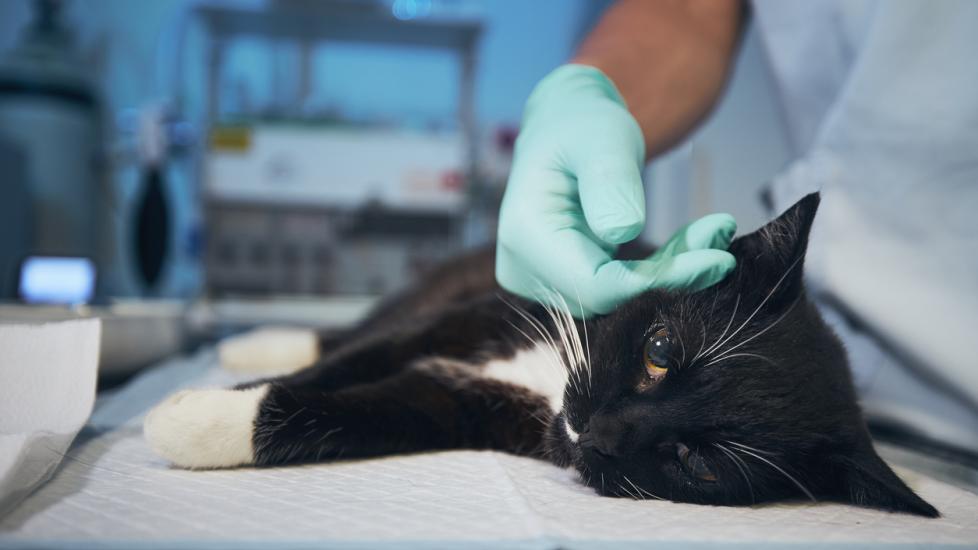Malignant Hyperthermia in Cats
What Is Malignant Hyperthermia in Cats?
Malignant hyperthermia, often triggered by a stressful event, is a dysregulation of calcium in the body that causes sustained muscle contraction, seen as stiffness in muscle groups such as in the arms and legs. It is much more common in pigs than in cats, but when it does occur it is a life-threatening condition and a medical emergency.
In cases of malignant hyperthermia, the cells’ energy stores become depleted, leading to an increase in oxygen demand and the production of heat often exceeding temperatures well above that of normal (100.5-102.5 F). This leads to cell death and the subsequent release of cell contents such as potassium into the blood. These elevated potassium levels can cause cardiac arrest and death.
Symptoms of Malignant Hyperthermia in Cats
Most cases of malignant hyperthermia in cats occur under anesthesia; therefore, you as the pet parent won’t be present to see the signs. However, as malignant hyperthermia has also occurred during times of stress or exercise, it’s important to be aware of what to look out for and when to seek medical attention.
Common signs are:
-
Tachycardia (higher than normal heart rate)
-
Tachypnea (abnormally rapid breathing)
-
Fever, often reaching >106 F
-
Muscle rigidity
-
Arrhythmias (irregular heartbeats)
-
Irregular blood pressure
Causes of Malignant Hyperthermia in Cats
In people, malignant hyperthermia is an inheritable disease—this has also been shown in animals, although it can occur sporadically. For animals that are susceptible, triggering events such as excitement, exercise, stress, and inhalant anesthetic gases are the main causes. Medications such as succinylcholine, a neuromuscular blocking agent, have also been shown to cause malignant hyperthermia.
How Veterinarians Diagnose Malignant Hyperthermia in Cats
As testing is extremely limited and somewhat invasive (requiring muscle biopsy), a diagnosis is usually made when there are signs of malignant hyperthermia correlative to anesthesia or a stressful event. Unfortunately, the available tests do not offer rapid diagnosis in a crisis. Some supportive laboratory evidence in addition to the above symptoms includes:
-
Electrolyte abnormalities
-
Increased kidney values (BUN, CREA)
-
Increased CK, a muscle enzyme
-
Impaired clotting ability (increases in PT/PTT)
-
Myoglobinuria (brown-colored urine due to muscle breakdown)
If your cat has survived a prior episode of malignant hyperthermia or has a known family member with the condition, it is extremely important that you share that information with your veterinarian, as certain precautions can and should be taken if your cat requires anesthesia.
Treatment of Malignant Hyperthermia in Cats
As noted, malignant hyperthermia is a true medical emergency. Any anesthesia being administered should be discontinued immediately and 100% oxygen should be given to the cat.
Supportive care measures with antiarrhythmics, ventilation, IV fluids, and external cooling measures with ice packs and fans are often required. Dantrolene, a muscle relaxant, is often administered as well.
Recovery and Management of Malignant Hyperthermia in Cats
Unfortunately, the prognosis for malignant hyperthermia is usually fatal, but for cats that survive or for those where detection and treatment occurred early on, the prognosis varies depending on the degree of severity of the episode and the resulting side effects. For example, a body temperature of >106 F can cause cerebral edema (swelling of the brain) and an increase in blood clotting, so even if your cat survives, there may be significant long-term damage in which quality of life would need to be considered.
Featured Image: iStock.com/Chalabala
Help us make PetMD better
Was this article helpful?
